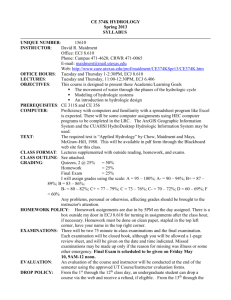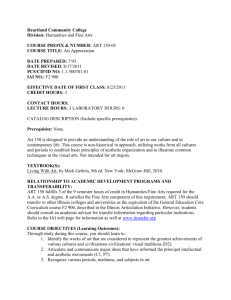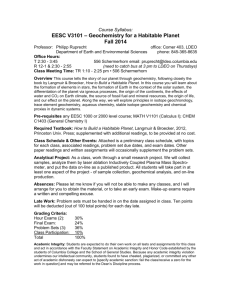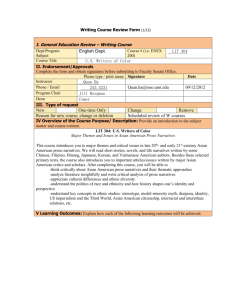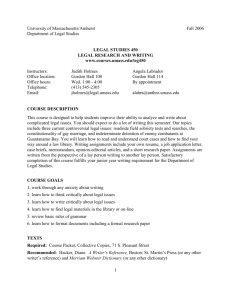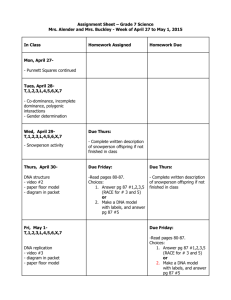The Home and the World: Women and Gender in South Asia
advertisement
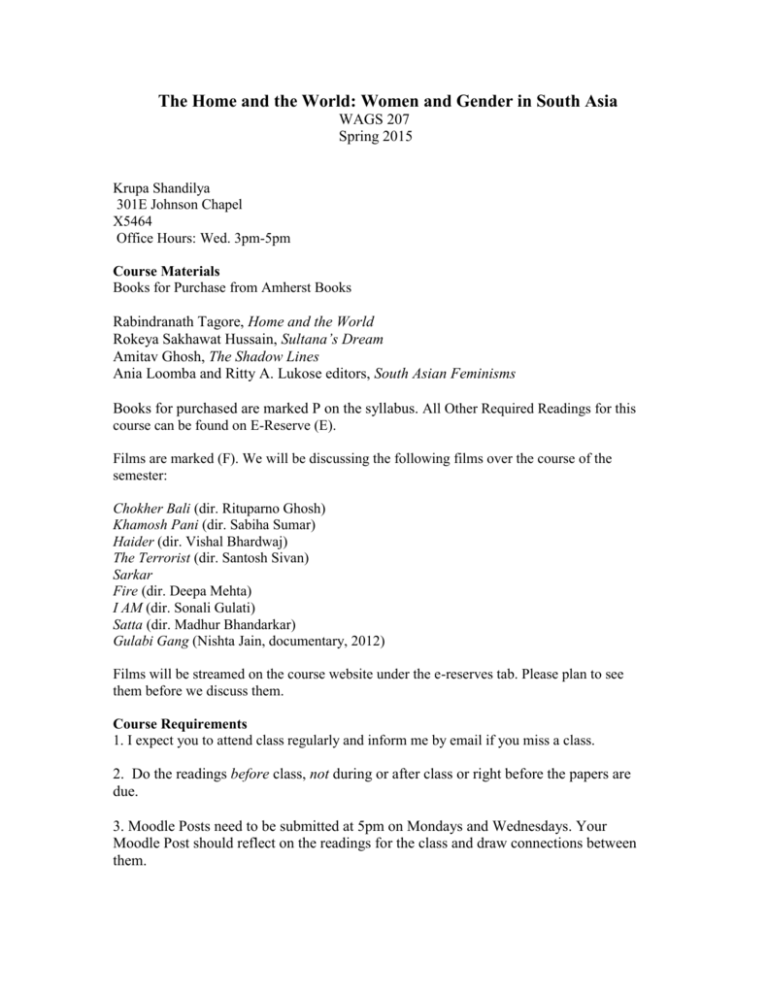
The Home and the World: Women and Gender in South Asia WAGS 207 Spring 2015 Krupa Shandilya 301E Johnson Chapel X5464 Office Hours: Wed. 3pm-5pm Course Materials Books for Purchase from Amherst Books Rabindranath Tagore, Home and the World Rokeya Sakhawat Hussain, Sultana’s Dream Amitav Ghosh, The Shadow Lines Ania Loomba and Ritty A. Lukose editors, South Asian Feminisms Books for purchased are marked P on the syllabus. All Other Required Readings for this course can be found on E-Reserve (E). Films are marked (F). We will be discussing the following films over the course of the semester: Chokher Bali (dir. Rituparno Ghosh) Khamosh Pani (dir. Sabiha Sumar) Haider (dir. Vishal Bhardwaj) The Terrorist (dir. Santosh Sivan) Sarkar Fire (dir. Deepa Mehta) I AM (dir. Sonali Gulati) Satta (dir. Madhur Bhandarkar) Gulabi Gang (Nishta Jain, documentary, 2012) Films will be streamed on the course website under the e-reserves tab. Please plan to see them before we discuss them. Course Requirements 1. I expect you to attend class regularly and inform me by email if you miss a class. 2. Do the readings before class, not during or after class or right before the papers are due. 3. Moodle Posts need to be submitted at 5pm on Mondays and Wednesdays. Your Moodle Post should reflect on the readings for the class and draw connections between them. 4. There will be three papers. The approximate weighting is as follows: Paper 1: (4-5 pages) 20% of base grade Paper 2: (4-5pages) 20% of base grade Paper 3: (6-7 pages) 30% of base grade Class Attendance and Participation (includes Moodle Post): 30% WEEK 1 Thurs. Jan 22nd: Introduction WEEK 2: Tues. Jan. 27th: Conceptualizing Gender Inequality Uma Narayan, Dislocating Cultures: Identities, Traditions & Third World Feminism (1997), 1-40 (E) Lata Mani, “Multiple Mediations: Feminist Scholarship in the Age of Multinational Reception” Feminist Review (1990) 35, 24–41 (E) UNIT I: COLONIALISM Thurs. Jan 29th: The Woman’s Question Lata Mani, “Contentious Traditions: The Debate on Sati in Colonial India” Cultural Critique 7 (1987) (E) Katherine Mayo, Mother India Chapter 1 and 2 (E) WEEK 3: Tues. Feb 3rd: Hindu Wife, Hindu Nation Partha Chatterjee, “The Nationalist Resolution of the Women’s Question” Recasting Women (1990) 233-253 (E) *Chokher Bali (dir. Rituparno Ghosh) (F) Thurs. Feb. 5th: Tanika Sarkar, “The Hindu wife and the Hindu nation: Domesticity and nationalism in nineteenth century Bengal” Studies in History, August 1992 8: 213-235 Durba Ghosh, “Decoding the nameless: gender, subjectivity, and historical methodologies in reading the archives of colonial India” in A new imperial history (ed.) Kathleen Wilson (E) UNIT II: NATIONALISM WEEK 4: Tues. Feb. 10th: Conceptualizing Mother India Mrinalini Sinha, “Refashioning Mother India: Feminism and Nationalism in LateColonial India,” Feminist Studies, Vol. 26, No. 3, Points of Departure: India and the South Asian Diaspora (Autumn, 2000), pp. 623-644 (E) Mahua Sarkar, “Muslim Women and the Politics of Invisibility in Late Colonial India,” Journal of Historical Sociology, 14.2 (June 2001): 226-250 (E) Thurs. Feb. 12th: Swadeshi and Swaraj I Rokeya Sakhawat Hussain, Sultana’s Dream (1905) (On Moodle Site) Rabindranath Tagore, Home and the World (1916) Part I Friday Feb. 13th: Talk by Bishnupriya Ghosh (Details TBA) WEEK 5 Tues. Feb. 17th: Swadeshi and Swaraj II Rabindranath Tagore, Home and the World (1916) Part II M.K. Gandhi, Hind Swaraj Chapters 4, 13 (E) Thurs. Feb. 19th: Partition I Ritu Menon, “Reproducing the Legitimate Community,” Appropriating Gender (ed.) Patricia Jeffery and Amrita Basu (1997): 15-32 (E) *Khamosh Pani (F) (dir. Sabiha Sumar) Friday Feb. 20th: Paper 1 Due WEEK 6 Tues. Feb. 24th: Partition II Kavita Daiya, “Honourable Resolutions:’ Gendered Violence, Ethnicity and the Nation,” Alternatives: Global Local Political vol. 27, no. 2 April-June 2002 Sadat Hasan Manto, “Open it,” and “Cold Meat,” Stories about the Partition of India (ed.) Alok Bhalla (E) Rajinder Singh Bedi, “Lajwanti,” Stories about the Partition of India (ed.) Alok Bhalla (E) Lalithambika Antharjanam, “A Leaf in the Storm,” Stories about the Partition of India (ed.) Alok Bhalla (E) UNIT III: POSTCOLONIAL CONUNDRUMS Thurs. Feb. 26th : Ethnic Conflict and Civil War: Kashmir Haider (film) Basharat Peer, Curfewed Night Chapter 9, 10, 11 WEEK 7 Tues. March 3rd: Ethnic Conflict and Civil War: Sri Lanka Neloufer de Mel, “Agent or Victim? The Sri Lankan Woman Militant in the Interregnum‖ Women & the nation's narrative: gender and nationalism in twentieth century Sri Lanka. (E) De Alwis, “Feminist Politics and Maternal Agonism,” in South Asian Feminisms (P) The Terrorist (F) (dir. Santosh Sivan) (F) Thurs. March 5th: Contestations Around Secularism and Minority Rights in India Pathak, Z., and R. Sunder Rajan, "Shahbano".' Signs 14.3 (1989) Atrayee Sen, “Right Wing Hindu Women” in South Asian Feminisms (P) WEEK 8 Tues. March 10th: Islamization in Pakistan Amina Jamal, Global discourses, Situated Traditions and Muslim Women’s Agency in Pakistan, in South Asian Feminisms (P) Ahmed-Ghosh, “Dilemmas of Islamic and Secular Feminists and Feminisms,” Journal of International Women’s Studies Thurs. March 12th: Anti-Minority Violence Amrita Basu, “Women's Activism and the Vicissitudes of Hindu Nationalism” Journal of Women's History, Volume 10, Number 4, Winter 1999 pp. 104-124 Sarkar (film) SPRING BREAK: March 14th-22nd WEEK 9 Tues. March 24th: Conceptualizing Statehood The Shadow Lines UNIT IV: EVERYDAY VIOLENCE Thurs. March 26th : Sexualities I: Homosexuality in India Jigna Desai, “Homo on the Range: Mobile and Global Sexualities” Social Text, Volume 20.4, (2002): 65-89 *Fire (F) (dir. Deepa Mehta) Friday March 27th: PAPER 2 DUE WEEK 11 Tues. March 31st: Sexualities II: Section 377 Arvind Narrain, “Queer Struggles Against the Law: The Contemporary Context” Sexualities (ed.) Nivedita Menon Chayanika Shah, “The Roads that E/Merged: Feminist Activism and Queer” Because I have a Voice I Am (film) Thurs. April 2nd: Sexualities III: Sex Workers Asim, “Keeping Sexuality in the Agenda” in South Asian Feminisms (P) Ghose “Politicizing Political Society” in South Asian Feminisms (P) WEEK 11 Tues. April 7th: Sexualities IV: Violence against Women Krupa Shandilya, “Nirbhaya’s Body: The Politics of Protest in the Aftermath of the Delhi Gang Rape” Gender and History (February 2015) Libby Purves, “Gang-rape shame could drag India into 21st century” The Times, January 1, 2013 “Statement by women’s and progressive groups and individuals condemning sexual violence and opposing death penalty” <http://kafila.org/2012/12/24/statement-bywomens-and-progressive-groups-and-individuals-condemning-sexual-violence-andopposing-death-penalty/> Thurs. April 9th: Caste I Ranajit Guha, "Chandra's Death", Subaltern Studies V (Delhi: Oxford, 1987), pp. 135165 WEEK 12 Tues. April 14th: Caste II Anupama Rao, "Understanding Sirasgaon: Notes Towards Conceptualizing the Role of Law, Caste, and Gender in a Case of 'Atrocity', " Thamyris, Vol. 4. 1, Spring 1997: 103136 Mahasveta Devi, "Draupadi" trans. by Gayatri Chakravorty Spivak, Critical Inquiry, Vol. 8, No. 2, Writing and Sexual Difference (Winter 1981), pp. 381-402 Thurs. April 16h: Caste III Mahasweta Devi, “Douloti The Bountiful” Imaginary Maps Trans., G. Spivak, (1995): 19-94 UNIT V: WOMEN, POWER AND COLLECTIVE ACTION WEEK 13 Tues. April 21st: Institutional Routes Rajeswari Sundar Rajan, “Gender, Leadership and Representation: The Case of Indira Gandhi” in Real and imagined women: gender, culture, and post colonialism *Satta (F) Thurs. April 23rd: Feminism/Women’s Movements I Nishta Jain, Gulabi Gang (documentary) (2012) Kapur, “Hecklers to Power?” in South Asian Feminisms (P) WEEK 14 Tues. April 28th : Feminism/Women’s Movements II Shaheed, “The Women’s Movement in Pakistan” Kannabiran, “Feminist Deliberative Politics in India” Women’s Movements in a Global Era, Basu ed. Thurs. April 30th: Student Conferences WEEK 15 Tues. May 5th: No Class Sunday May 10th: Paper 3 DUE


